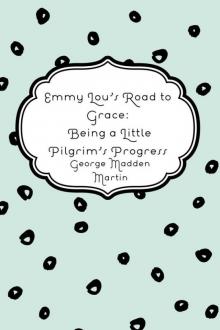


Emmy Lou's Road to Grace: Being a Little Pilgrim's Progress
Howard Roger Garis

Produced by David Garcia, Emmy and the Online DistributedProofreading Team at https://www.pgdp.net (This file wasproduced from images generously made available by TheKentuckiana Digital Library)
EMMY LOU'S ROAD TO GRACE
"'Its name,' said Miss Eustasia severely, 'is theHighland Fling.'"
[PAGE 152]]
EMMY LOU'S
ROAD TO GRACE
_BEING A LITTLE PILGRIM'S PROGRESS_
BY
GEORGE MADDEN MARTIN
AUTHOR OF EMMY LOU, ETC.
_What danger is the pilgrim in! How many are his foes! How many ways there are to sin No living mortal knows._ --THE PILGRIM'S PROGRESS
GROSSET & DUNLAP PUBLISHERS NEW YORK
Made in the United States of America
COPYRIGHT 1916, BY D. APPLETON AND COMPANY Printed in the United States of America
TO THAT HOSTAGE GIVEN TO THE FUTURE THE AMERICAN CHILD
PREFACE
SOME years ago a collection of short stories under the title, "Emmy Lou:Her Book And Heart," was offered to the American public as a plea forand a defense of the child as affected by the then prevailing stupidityof the public schools.
The present series of stories is written to show that the sameconditions which in the school make for confusion in the child's mind,exist in the home, in the Sunday school and in all its earlier points ofcontact with life; the child who presents itself at six or even at five,to the school and teacher, being already well on the way in the schoolof life, and its habits of mind established.
It is the contention of these new stories that the child comessingle-minded to the experience of life. That it brings to thisexperience a fundamental, if limited, conception of ethics, justice,consistency and obligation. That it is the possessor of an innateconscience that teaches it to differentiate between right and wrong,and that the failure to find an agreement between ethics and experienceconfronts the child long before its entrance at school.
Not only do its conceptions fail to square with life as it finds it, butthe practices and habits of the persons it looks up to fail to squarewith what these elders claim for life. Further, the child meets with aninnate stupidity on the part of its elders that school cannot surpass, astupidity which assumes knowledge on the child's part that it cannotpossibly have.
These conditions make for confusion in the child's mind, and aconsequent impairment of its reasoning faculties, before it presentsitself to the school.
Given the very young child struggling to evolve its working rule out ofnebulae, how do its elders aid it? The isolated fact without backgroundor connection, the generalization with no regard to its particularapplication, the specific rule that will not fit the general case--thesetoo often are its portion, resulting in lack of perspective, no sense ofproportion, and no grasp of values. The child's conceptions of thecardinal virtues, the moral law, the fatherhood of God, the brotherhoodof Christ, the human relation, are true, garbled, or false, inaccordance with the interpreting of its elders.
The child thus has been in the training of the home, the neighborhood,and the Sunday school, for approximately four, three, and two yearsrespectively, before it comes to the school of letters.
One of the intelligences thrashing out the problems of the school today,says:
"Education begins at the age of two or sooner, whether the parent willsit or not. The home influence from two to six, for good or ill indetermining the mental no less than the moral status, is the mostpermanent thing in the child's life. Even at the age of five, thedifficulty for the teacher in making a beginning, lies in the fact thatthe beginning already has been made."
In the original stories portraying the workings of the schoolroom on themind of the child, the physically normal, mentally sound but slow typewas used, in the child called Emmy Lou, and in now seeking to show thatthe conditions making for more or less permanent confusion in thechild's mind antedate the schoolroom, it has seemed wise to make use ofthe same child in the same environment.














